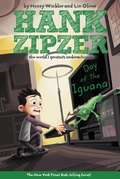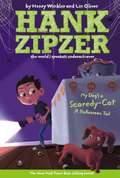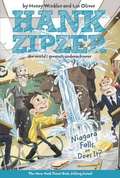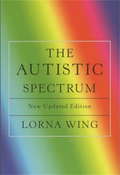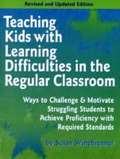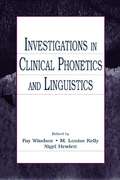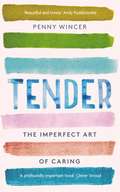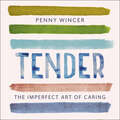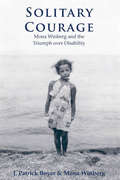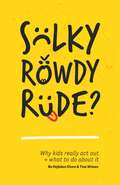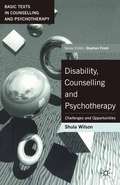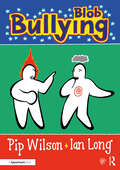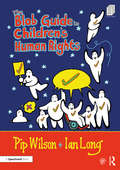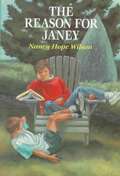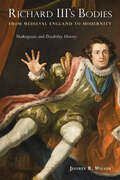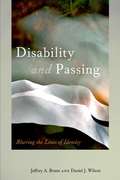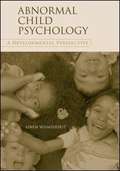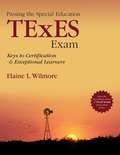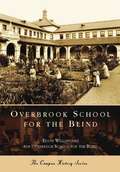- Table View
- List View
Day of the Iguana (Hank Zipzer, the World's Greatest Underachiever #3)
by Henry Winkler Lin OliverIt's science project time in Ms. Adolf's class. This is good news and bad news for Hank--he loves science, but he hates the report part. So Hank turns to TV to take his mind off things. But when the program directory scrolls by too quickly for Hank to know what's on, he decides to take apart the cable box to try to slow down the crawl. Great! Now Hank has found the perfect science project! But what he wasn't counting on was his sister's pet iguana laying eighteen eggs in the disassembled cable box. How is Hank going to get out of this one?
Help! Somebody Get Me Out of Fourth Grade! (Hank Zipzer, the World's Greatest Underachiever #7)
by Henry Winkler Lin OliverIt's time for the end of year parent-teacher conference, and Hank's in a panic. He's afraid that his teacher is going to tell his parents that he has to repeat the fourth grade. So Hank creates an elaborate scheme to have his parents win an out-of-town trip so they're gone during the conference days. Of course, the plan backfires. Will Hank have to stay in fourth grade forever?
Holy Enchilada! (Hank Zipzer, the World's Greatest Underachiever #6)
by Henry Winkler Lin OliverPS 87 is having multicultural week, and Ms. Adolf's class is putting on a "Foods from Around the World" luncheon. Hank is thrilled--no reading, no outlining, and no review questions, just cooking! Hank makes enchiladas, and at the luncheon, Ms. Adolf piles her plate with lots of food. But after a few bites, her face turns bright red--one of the dishes is super-spicy! Ms. Adolf accuses someone of playing a mean practical joke, and punishes the entire class with no recess until the guilty party comes forward. Hank realizes his trouble with numbers might have caused the problem--what if he accidentally used three cups of peppers instead of 1/3 cup? Will Hank be able to get recess back for everyone without getting detention for the rest of his life?
My Dog's a Scaredy-Cat: A Halloween Tail (Hank Zipzer, the World's Greatest Underachiever #10)
by Henry Winkler Lin OliverTeased by the school bully because of his Halloween costume, underachieving Hank, with the help of his friends, exacts revenge by creating the scariest and grossest haunted house ever and inviting the bully to visit.
My Secret Life as a Ping- Pong Wizard (Hank Zipzer, the World's Greatest Underachiever #9)
by Henry Winkler Lin OliverHank thought that getting through summer school to get to the fifth grade would be hard enough, but little did he know that it would get worse! Everyone in the fifth grade is starting to focus on a sport--and they're really good. Everyone, that is, except Hank.
Niagara Falls, or Does It? (Hank Zipzer, the World's Greatest Underachiever #1)
by Henry Winkler Lin OliverHank Zipzer wants to do well in fourth grade.<P><P> He's smart, creative and funny but writing a five paragraph essay about what he did last summer sounds impossible because he's not so good at writing, spelling or other school subjects. Since he can't write about Niagara Falls, he decides to build it. The idea sounds great and his friends are helping. To his amazement, his project doesn't go over at all well in school and now he may not be able to be in the magic show he and his pals Frankie and Ashley have cooked up.<P> As hard as Hank tries to do school assignments like other kids, he spends all of his energy trying to stay out of trouble because he can't do the work. Then he winds up in trouble anyway. Finally a teacher he meets while in detention has an idea that might help him in school and his parents begin to understand he actually has talents! Search for the author, Henry Winkler and find more funny books about Henry Zipzer in the Bookshare collection.
The Zippity Zinger (Hank Zipzer, the World's Greatest Underachiever #4)
by Henry Winkler Lin OliverHank LOVES baseball. L-O-V-E-S it! <P><P>Unfortunately, though, he's not very good at the game. So everyone is surprised--including Hank himself--when Hank throws a zinger pitch at a practice for P.S. 87's annual School Olympiad baseball game. Hank knows how he pitched the "Zippity Zinger"--it must have happened because he accidentally wore his sister Emily's lucky monkey socks!Because of that stellar pitch, Hank has been chosen to pitch for P.S. 87 for the Big Game. The pressure is on--Hank's got to wear those socks again, or risk blowing the biggest ball game of his life. The only problem is, Emily wants to wear the lucky monkey socks herself since she's competing in the Brain Buster for the Olympiad. Will Hank be able to pull off another Zippity Zinger--or will he strike out?
The Autistic Spectrum: Revised edition
by Ms Lorna Wing'Authoritative, compassionate and commonsensical . . . an honest, sensitive and thorough introduction to understanding and living with autism . . . highly recommended.' - Psychological Medicine'Packed with down to earth, practical ideas . . . readable, interesting . . . informative . . . if you buy only one title about autism this year it should be this one.' - Collette Dritte, Nursery WorldOver 500,000 people of all ages in the UK have disorders in the autistic spectrum. About one-third also have varying degrees of learning difficulty. All have impairment of social interaction, communication and imagination - the world appears a bewildering and sometimes frightening place. This acclaimed, authoritative guide explains how people with autism experience the world and why they need an organized, structured environment, presenting a window into the world of those with the disorder. Wing suggests ways of improving communication, developing abilities and widening social interaction, and how to cope with stresses within the family.
The Autistic Spectrum: Revised edition
by Lorna Wing'Authoritative, compassionate and commonsensical . . . an honest, sensitive and thorough introduction to understanding and living with autism . . . highly recommended.' - Psychological Medicine'Packed with down to earth, practical ideas . . . readable, interesting . . . informative . . . if you buy only one title about autism this year it should be this one.' - Collette Dritte, Nursery WorldOver 500,000 people of all ages in the UK have disorders in the autistic spectrum. About one-third also have varying degrees of learning difficulty. All have impairment of social interaction, communication and imagination - the world appears a bewildering and sometimes frightening place. This acclaimed, authoritative guide explains how people with autism experience the world and why they need an organized, structured environment, presenting a window into the world of those with the disorder. Wing suggests ways of improving communication, developing abilities and widening social interaction, and how to cope with stresses within the family.
Teaching Kids with Learning Difficulties in the Regular Classroom: Ways to Challenge and Motivate Struggling Students to Achieve Proficiency with Required Standards
by Susan WinebrennerProven ways to help special education, "slow", and "remedial" students learn and achieve.
Investigations in Clinical Phonetics and Linguistics
by Fay Windsor M. Louise Kelly Nigel HewlettInvestigations in Clinical Phonetics and Linguistics is a sequel to the eighth meeting of the International Clinical Phonetics and Linguistics Association, attended by delegates from 26 different countries. This book reflects the scope of the subject area of clinical phonetics and linguistics, the balance of input into it with respect to the different kinds of research being carried on, and the representation of researchers from different parts of the world. Its scope includes the application of all levels of linguistic analysis and the chapters of the book have been ordered as far as possible according to linguistic level, beginning with pragmatics and ending with acoustics. It will be immediately apparent that a greater number of chapters are concerned with applications of phonetics and phonology then with any other levels.
Tender: The Imperfect Art of Caring - 'profoundly important' Clover Stroud
by Penny Wincer'A beautiful and important book that is both deeply engaging and usefully practical. I loved it.' CATHY RENTZENBRINK'An insightful and well-timed book ... forces us to confront the stereotypes - and prejudices - we hold.' SUNDAY TIMES'profoundly important...full of wisdom and bright insights on what it really means to love someone, by a fearless and generous writer. ' CLOVER STROUD'A beautiful and timely reminder that each and every one of us has the ability to care, the capacity for empathy, and the potential to grow.' ANDY PUDDICOMBE, FOUNDER OF HEADSPACE'A wonderful book: compassionate, honest, carefully-reasoned and genuinely helpful... This will benefit many people.' KATHERINE MAY, author of WINTERING 'An invaluable tool for any invisible carers or anyone who wants to learn how to better support their loved ones... we ALL have many, many things to learn from Penny's beautiful, wise, charming, thoughtful words' SCARLETT CURTIS, Sunday Times bestselling author'Moving and beautifully written, nuanced and wise, alert to every paradox at the heart of love. A hugely important book not only for current or future carers, but anyone learning to accept that life tends to resist our control.' OLIVIA SUDJIC, author of EXPOSURE'Tender captures the powerful capacity of people to care for others, and all the heartbreaking and heartwarming complexity that this involves. Penny brings the crucial, yet often overlooked, role of caring into our collective consciousness and, in doing so, demonstrates what it means to be human.' -DR EMMA HEPBURN, author of A TOOLKIT FOR MODERN LIFE'Penny Wincer's TENDER manages to combine both unromanticised honesty about the realities of care with a genuine uplifting hopefulness... is a must-read.' RUTH WHIPPMAN, author of THE PURSUIT OF HAPPINESSWe are all likely - at some point in our lives - to face the prospect of caring for another, whether it's a parent, child or partner. It is estimated that there are 7 million people in the UK caring for loved ones. And yet these are the unpaid, unsung people whose number is rising all the time. In Tender: the imperfect art of caring, Penny Wincer combines her own experiences as a carer with the experiences of others to offer real and transformative tools and insights for navigating a situation that many of us are either facing or will face at some time. Penny Wincer has twice been a carer: first to her mother, and now as a single parent to her autistic son. Tender shows how looking after oneself is a fundamental part of caring for another, and describes the qualities that we can look to cultivate in ourselves through what may otherwise feel to be an exhausting task. Weaving her lived experience with research into resilience, perfectionism and self-compassion, Penny combines the stories of other carers alongside those who receive support - offering an often surprising and hopeful perspective.Penny hosts a podcast Not Too Busy To Write.
Tender: The Imperfect Art of Caring - 'profoundly important' Clover Stroud
by Penny WincerA personal, positive and essential book for the many carers among us. 'A wonderful book: compassionate, honest, carefully-reasoned and genuinely helpful... This will benefit many people.' KATHERINE MAY, author of WINTERING 'An invaluable tool for any invisible carers or anyone who wants to learn how to better support their loved ones... we ALL have many, many things to learn from Penny's beautiful, wise, charming, thoughtful words' - SCARLETT CURTIS, Sunday Times bestselling author'An astonishing book about everyday experience. Moving and beautifully written, nuanced and wise, alert to every paradox at the heart of love. A hugely important book not only for current or future carers, but anyone learning to accept that life tends to resist our control.' - OLIVIA SUDJIC, author of EXPOSURE'Penny Wincer's TENDER manages to combine both unromanticised honesty about the realities of care with a genuine uplifting hopefulness... is a must-read.'- Ruth Whippman, author of THE PURSUIT OF HAPPINESS: WHY ARE WE DRIVING OURSELVES CRAZY AND HOW CAN WE STOP?We are all likely - at some point in our lives - to face the prospect of caring for another, whether it's a parent, child or partner. It is estimated that there are 7 million people in the UK caring for loved ones. And yet these are the unpaid, unsung people whose number is rising all the time. In Tender: the imperfect art of caring, Penny Wincer combines her own experiences as a carer with the experiences of others to offer real and transformative tools and insights for navigating a situation that many of us are either facing or will face at some time. Penny Wincer has twice been a carer: first to her mother, and now as a single parent to her autistic son. Tender shows how looking after oneself is a fundamental part of caring for another, and describes the qualities that we can look to cultivate in ourselves through what may otherwise feel to be an exhausting task. Weaving her lived experience with research into resilience, perfectionism and self-compassion, Penny combines the stories of other carers alongside those who receive support - offering an often surprising and hopeful perspective.
Solitary Courage: Mona Winberg and the Triumph over Disability
by Mona Winberg J. Patrick BoyerSolitary Courage is the story of a mother’s tough-love determination, her severely disabled daughter’s astonishing triumphs, and a documentary record of the political battles, organizational conflicts, and human struggles that citizens with disabilities face and fight every day of their lives. Mona Winberg became a pioneer of independent living, and emerged a leading advocate for citizens with mental and physical disabilities. Her courageous causes erupted from her deep reservoir of compassion and concern. Her unflinching challenges to the status quo expressed both optimism and realism about life and society. Her life is testament to the power of Solitary Courage. Between 1986 and 1999 she was the only newspaper columnist in North America regularly writing about disability issues. Through her award-winning column "Disabled Today" in Toronto’s Sunday Sun, Mona Winberg painstakingly built up a body of work of more than 600 articles chronicling front-line battles for equality. She was a realist, a wise person with a no-nonsense approach, kindly, but clear-eyed. Solitary Courage begins with the story of Mona Winberg’s life, followed by a representative selection of 156 of her columns organized into 20 thematic chapters, the best of Mona in her own words. The last part of the book reflects upon Mona Winberg’s legacy of lessons that still connect to programs and policies touching the lives of Canadians with disabilities today. The subjects are wide-ranging and engaging because Mona used personal examples of individuals with disabilities and news-making issues raised by their plight. She also reported on the street-level outcomes of government policies. This variety and approach to disability issues provides real education and genuine human interest, whatever a reader’s background or experience.
Sulky, Rowdy, Rude?: Why kids really act out and what to do about it
by Tina Wiman Bo Hejlskov ElvénChildren can go through difficult phases - this is a natural part of growing up. Conflicts and arguments are nothing exceptional, but rather a part of everyday family life. The authors of this practical and imaginative book show how parents can create consistent and effective structures, methods and responses, so that children can learn for themselves how to practise self-control and cooperation in a secure environment where they both belong and have autonomy. Based on years of experience working with children, including those with special needs, the authors structure their methods around the low arousal approach. With many creative suggestions and real-life examples, this book has the potential to change family life for the better forever.
Disability, Counselling and Psychotherapy: Challenges and Opportunities
by Shula Wilson"What is Disability?" and "Why am I disabled?" asked Joe, the seven year old boy, born with cerebral palsy. . . Although disability is of concern to us all, very little attention has been paid to the felt experience of the disabled person and the ways in which psychotherapy might be constructively utilised. Disability, Counselling and Psychotherapy directly addresses this gap and, taking a life-span perspective and a psychoanalytic approach, actively explores the challenges and opportunities of disability to therapy, the caring professions and society more widely. Shula Wilson introduces a model aimed at achieving autonomy that is based on the significance of the primary mother-baby relationship and the awareness of human mortality. In doing so she offers a new way of relating to disabled people and working through unanswerable questions such as those raised by Joe, above. She also challenges attitudes and reactions to controversial issues such as sex, death and the mystery behind altering body image, and brings to the surface the desires, hopes and frustrations of disabled people living in an environment ridden with fears and prejudices. With its lively case discussion and clear theoretical base, Disability, Counselling and Psychotherapy is a vital resource for all practising professionals and trainees.
Blob Bullying (Blobs)
by Pip Wilson Ian LongThis practical and accessible resource contains a wealth of discussion sheets and games to help victims of bullying reflect and talk about their experiences and feelings using the internationally familiar Blob figures. Diverse and inclusive, the Blob figures are a proven way to help children and adults share their feelings and experiences. Without age, culture or gender, they enable the individual to focus on feelings and body language. In this book, the Blobs explore bullying. From Blob Trees to Bingo games, cards and emotional scales, the Blobs provide a visual structure that allows children, teenagers and adults to open up about being bullied. Offering unique activities that help scaffold conversations for people of all ages and abilities, this is an essential resource for teachers, teaching assistants, youth and social workers, psychologists, counsellors and all those who work with and have caring responsibilities for others.
The Blob Guide to Children’s Human Rights
by Pip Wilson Ian LongThis practical resource is designed to support children and young people as they develop an understanding of the basic rights that we are all entitled to as humans. Diverse and inclusive, Blob figures have proven themselves to be a valuable way of sparking discussion of difficult topics through the universal means of body language and feelings. Based upon the UN Convention on the Rights of the Child, this book introduces 'Blob Trees', lines and images with prompt questions and activities to help children to consider concepts such as freedom of movement and speech, safety and equality. It encourages children to think about the ways in which they can apply human rights articles to their own lives, by treating others with kindness, fairness and respect. Key features include: ‘How to use’ guides and prompt questions for each topic Simplified and child-friendly versions of all 42 human rights articles Photocopiable and downloadable worksheets designed to be used with individuals and groups of all sizes. With clear and supportive guidance and a graduated approach, this is an essential tool for teachers and practitioners looking to support an understanding of human rights in children and young people. It will also be invaluable for any groups wishing to develop accreditation for UNICEF’s ‘Rights Respecting Schools’ Awards.
The Reason for Janey
by Nancy Hope WilsonPhilly’s life changes greatly when, after her parents' divorce, her mother takes in Janey, a retarded adult, to live with them. "I like to know the reasons for things,” says Philura Higley Mason. “When I know the reason for something, it fits. I can manage it.” She especially wants to know why Janey, a mentally retarded woman who moved in four months ago, fits into the family better than Dad, who moved out three years ago. After all, what makes a family a family? Last year, Philly won first prize at the fifth-grade science fair, so this year, superbrain Danny Stapleton is determined to outdo her. But Philly can’t even choose a topic. She’s wondering instead about Janey--that little-girl locket she wears, that mismatched pack of cards she carries, and that place she lived that makes Mom strangely angry: the Morrisville State School for the Mentally Retarded. And when Janey’s mother died, what happened to her father? As Philly uncovers Janey’s past, she unexpectedly collides with her own. Suddenly she must confront new truths about Dad, about Mom, and about herself. (She even makes some discoveries about Danny Stapleton.) The author of Bringing Nettie Back (also Macmillan U.S.A.) has artfully interwoven such complex issues as divorce, mental retardation, keeping secrets, and what it really means to be a family.
Richard III's Bodies from Medieval England to Modernity: Shakespeare and Disability History
by Jeffrey R. WilsonRichard III will always be central to English disability history as both man and myth—a disabled medieval king made into a monster by his nation’s most important artist. In Richard III’s Bodies from Medieval England to Modernity, Jeffrey Wilson tracks disability over 500 years, from Richard’s own manuscripts, early Tudor propaganda, and x-rays of sixteenth-century paintings through Shakespeare’s soliloquies, into Samuel Johnson’s editorial notes, the first play produced by an African American Theater company, Freudian psychoanalysis, and the rise of disability theater. For Wilson, the changing meanings of disability created through shifting perspectives in Shakespeare’s plays prefigure a series of modern attempts to understand Richard’s body in different disciplinary contexts—from history and philosophy to sociology and medicine. While theorizing a role for Shakespeare in the field of disability history, Wilson reveals how Richard III has become an index for some of modernity’s central concerns—the tension between appearance and reality, the conflict between individual will and external forces of nature and culture, the possibility of upward social mobility, and social interaction between self and other, including questions of discrimination, prejudice, hatred, oppression, power, and justice.
No Sight - Great Vision: A Centenary History of the Association for the Blind
by J. W. WilsonThis text provides a history of the Association for the Blind in Australia.
Disability and Passing: Blurring the Lines of Identity
by Daniel J. Wilson Jeffrey A. BrunePassing--an act usually associated with disguising race --also relates to disability. Whether a person with a psychiatric disorder struggles to suppress aberrant behaviour to appear "normal" or a person falsely claims a disability to gain some advantage, passing is a pervasive and much discussed phenomenon. Nevertheless, Disability and Passing is the first anthology to examine this issue. The editors and contributors to this volume explore the intersections of disability, race, gender, and sexuality as these various aspects of identity influence each other and make identity fluid. They argue that the line between disability and normality is blurred, discussing disability as an individual identity and as a social category. And they discuss the role of stigma in decisions about whether or not to pass. Focusing on the United States from the nineteenth century to the present, the essays in Disability and Passing speak to the complexity of individual decisions about passing and open the conversation for broader discussion. Contributors include: Dea Boster, Allison Carey, Peta Cox, Kristen Harmon, David Linton, Michael Rembis, and the editors. Jeffrey A. Brune is Assistant Professor of History at Gallaudet University. Currently he is working on his monograph, Disability Stigma and the Modern American State. Daniel J. Wilson is Professor of History at Muhlenberg College. He is author of several books, including Polio: The Biography of a Disease and Living with Polio: The Epidemic and Its Survivors.
Abnormal Child Psychology: A Developmental Perspective
by Linda WilmshurstAbnormal Child Psychology: A Developmental Perspectiveis intended for undergraduate and Masters-level students enrolled in courses in Abnormal Child and Adolescent Psychology. Written from a developmental perspective, the book is organized around five prominent and recurring themes: the course of normal development proceeds in an orderly and predictable direction; maladaptive behaviors represent deviations from the normal path; maladaptive behavior is represented by a continuum of severity (symptoms, syndromes, disorders) based on the degree to which behaviors deviate from the norm; individual, interpersonal, contextual and cultural factors interact in a reciprocal way to influence normal development and abnormal deviations; theoretical input from diverse perspectives can guide our understanding of underlying processes that precipitate and maintain behaviors and the different developmental pathways that might result. The text provides students with a learning model which incorporates three essential cornerstones, which are pivotal to understanding child and adolescent psychopathology: the K3 paradigm that consists of knowledge of developmental expectations, knowledge of the sources of influence, and knowledge of the theoretical models. Each chapter opens with a case illustration to highlight the themes of the material that follows. The chapters conclude with a Summary Review, Glossary of New Terms and a Set of Review Questions.
Passing the Special Education TExES Exam: Keys to Certification and Exceptional Learners
by Elaine L. WilmoreGain confidence, lower stress, and raise your TExES exam scores! In this artful guide, TExES test prep veteran Elaine Wilmore breaks down the EC-12 and Supplemental special education test so you can feel calm and confident on test day. Built on her successful test-prep training seminars, she shows how to think like the test was developed and covers: Each special education domain and competency Philosophies behind the test questions Teaching stories that improve answer recall Tips for analyzing test questions Ways to use key words and concepts to improve test results Techniques for in-state and out-of-state test takers
Overbrook School for the Blind (The Campus History Series)
by Edith WilloughbySince 1832, Overbrook School for the Blind has been a leader in providing educational programs to children and young people who are blind and visually impaired. Julius Friedlander, the schools founder, and other early leaders worked hard to inform people about the educational needs of the children. Their efforts resulted in providing reading material for the blind and Overbrook's production of the first embossed book in America, the Gospel of Mark, and the publication of the first magazine for the blind, Lux en Tenebrae. Offering students access to all educational opportunities continues to be the schools main goal, and in the early 1990s, Overbrook pioneered the development of a school wide technology initiative that provided students with the ability to access the curriculum, communicate, and be successful in employment. Through rare photographs and documents, Overbrook School for the Blind offers a glimpse at the schools role in reaching out to people who are blind and it showcases how Overbrook has helped thousands of students to achieve independence, self-confidence, and the skills to experience active and fulfilling lives.
